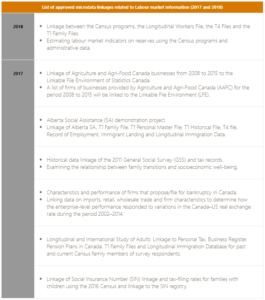
LMI and Microdata Linkages
This year’s Canadian Research Data Centre Network (CRDCN) conference was held in Hamilton from 17–19 October. Its title — “Building an Inclusive, Prosperous and Healthy Canada: What Can We Learn from the Data?” — was irresistible from a labour market information (LMI) perspective. Most presentations focused on health issues, but several labour market–related topics included the aging population, unemployment, and wage disparities.
Leveraging Administrative Data Linkages for Research
A variety of administrative and linked datasets were used in presentations. For instance, Tammy Schirle from Wilfrid Laurier University used 1965–2015 data from the Canada Pension Plan (CPP) to show life expectancy by distribution of earnings. Byron Spencer from McMaster University presented the age–income dynamics over the life course by using 1982–2012 data from the Longitudinal Administrative Data (LAD), a longitudinal sample of tax filers. Sweetman and Rana show that Canadian-born benefit recipients receive more at young and middle ages than at older ages, whereas the opposite is true for immigrants. They speculate this is due to the fact that younger immigrants are healthier than their Canadian-born counterparts.
The poster presentations also provided some great insights. Xavier St-Denis from Statistics Canada looked at intergenerational income mobility by linking the Longitudinal and International Study of Adults (LISA) and the T1 Family File (T1FF). University of British Columbia’s Jeffrey Hicks evaluated the effect of part-time work on EI beneficiaries using Employment Insurance (EI) administrative data. Statistics Canada’s Rose Evra, from the Social and Aboriginal Statistics Division, linked data from the Longitudinal Immigration Database (IMDB) to the Longitudinal Survey of Immigrants to Canada (LSIC) to show the income trajectory of new immigrants.
Using administrative datasets and linking them together or linking them to survey data is of growing interest among researchers. Such studies offer a number of strengths, but do come with some caveats.
The Power and Limitations of Administrative Data
Compared to survey data, administrative data provides more coverage plus longitudinal observations. Linking datasets through the microdata linkage program allows researchers and decision-makers to combine the advantages of different sources and improve the timeliness and reliability of information. A variety of cross-sectional or longitudinal analyses are possible as a result, depending on the nature of a linkage.
The following table lists the seven newly approved microdata linkages with related labour market information. See also StatsCan’s full updated lists (beginning in January 2000) of approved microdata linkages and their Directive on Microdata Linkage.

However, it’s not all good news. The number of variables in administrative data, specifically socio-demographic variables, are usually more limited than the ones in the survey data. In addition, administrative data is often available with some considerable lag, thus is often not as up-to-date as some survey data. And finally, while microdata linkages can be time consuming to generate and to protect confidentially, they provide a strong complement to traditional survey data collection methods.
The Way Forward
We must continue to push for more open data to build upon recent progress in linked dataset research. All linked microdata projects are accessible through the Research Data Centres (RDCs), the Federal Research Data Centres (FRDCs), and the Canadian Centre for Data Development and Economic Research (CDER).
For LMIC, linking sociodemographic information with labour market outcomes can help enhance the availability of timely, local, granular labour market data. Moving forward, we will explore using various data linkages, including the Education and Labour Market Longitudinal Platform (ELMLP) (approved in 2016) to analyze the effects of different factors on labour market outcomes.
Stay tuned for our upcoming research and products from LMIC on these and other topics.

Behnoush Amery is a Senior Economist with LMIC. Her work currently focuses on labour market information research related to the future of work, the relationship between education and labour market outcomes, as well as the estimation of granular labour data.
behnoush.amery@lmic-cimt.ca